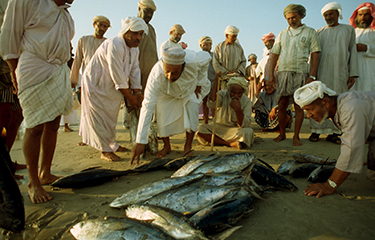While shifting to aquaculture, UAE proposes fuel subsidy for fisheries sector

The United Arab Emirates (UAE) has announced it plans to award subsidies to its fishing sector, just weeks after the World Trade Organization finalized a deal to end fuel subsidies to help reduce overfishing.
The UAE Ministry of Climate Change and the Environment has partnered with the Abu Dhabi National Oil Company and the Emirates National Oil Company to launch the subsidy scheme to help the country’s fishermen deal with rising costs, according to a report by Arabian Business.
The measure was introduced after Emirati Minister Mariam bint Mohammed Almheiri met with heads of fishermen’s associations to discuss current challenges to the country's fishing sector. The fuel subsidies are designed as a short-term assistance to fishermen to help them deal with surging fuel prices.
The subsidies will be awarded based on gross income and fishing activity, as well as family size and years spent in the industry, according to UAE’s State news agency WAM. The subsidy will help 500 fishermen in 2022, the government estimates.
The subsidy comes at a time when many nations have agreed to curtail their financial support of the fishing industry, with an aim toward improving the environmental sustainability of the global fishing industry and level the seafood playing field commercially. However, WTO’s recent agreement does not ban all subsidies, but rather just those that support fishing on the high seas or in another country’s waters. And it doesn’t have any provisions to bar fuel tax relief schemes.
The Organisation for Economic Co-operation and Development, an intergovernmental organization with 38 member countries, has estimated expenditure in support of fishing sector by governments worldwide totals USD 35 billion (EUR 34.8 billion), which averages to about 20 percent of the total value of all marine fish caught at sea and brought to port.
“Unfortunately, many of these subsidies are harmful to the long-term health of the sector, and can lead to overfishing and overexploitation of fishery resources,” OECD says.
The organization said the worst kind of subsidies to be those “that simply reduce fishers’ operating costs” and offsets the costs of normal maintenance items – such as fuel.
“Access to these types of inputs at below-market rates increases fishing activities and ultimately leads to depletion of fish stocks, lower fishing yields, and decreased incomes for fishers,” OECD said.
These subsidies, the organization says, “tend to favor larger fishers, not the smaller, traditional fishers who are considered most vulnerable.”
“New OECD research shows there are viable alternatives to the most harmful types of subsidies, and that an improved understanding of how subsidies affect the fishing sector can help governments achieve their goals,” the report said.
Currently, UAE’s fisheries sector, which is largely driven by small scale fishers, makes limited contribution to the economy of UAE, a country that is an approved seafood exporting country to the European Union. Oil and gas remains the largest contributor to the UAE economy, although the fisheries industry still has significant heritage value especially to local communities and urban areas.
On average, UAE’s average annual catch, comprising largely of gilthead seabream, marine shrimp, tilapia and sturgeon, is estimated at 73,000 metric tons, although the FAO said the country’s fisheries sector data collection system “is mostly based on market information and it may have overestimated the actual catches.”
The UAE has sought to grow its seafood industry, with a focus on supporting expansion of its aquaculture sector. Crown Prince of Dubai Shaikh Hamdan Bin Mohammad Bin Rashid Al Maktoum personally has a stake on the sector, and several public-private partnerships have been announced in recent years.
In 2018, salmon importer Vikings Label announced plans to build a USD 90 million (EUR 79.5 million) hatchery and recirculating aquaculture system in Dubai, according to Hatchery International.
In October 2020, U.A.E.’s Aqua Bridge struck a deal with Israel-based Aqua Green Israel for the development of recirculation aquaculture systems (RAS) to meet growing demand in the Middle East.
In March 2021, International Holding Company opened a new AED 200 million (USD 54.4 million, EUR 45 million) seafood-processing facility with a 40,000-metric-ton annual capacity.
And the UAE government has backed Emirates AquaTech's construction and operation of a land-based recirculating aquaculture system for sturgeon farming targeting production of up to 30 MT of caviar production annually.
This year, Dubai-based Ocean Harvest entered into a strategic partnership to build a land-based salmon farm in the UAE, with a planned annual output of 2,000 MT. And Dibba Bay Oysters has received government backing to pursue exports to the U.S.A.
Photo courtesy of the Food and Agriculture Organisation






Share